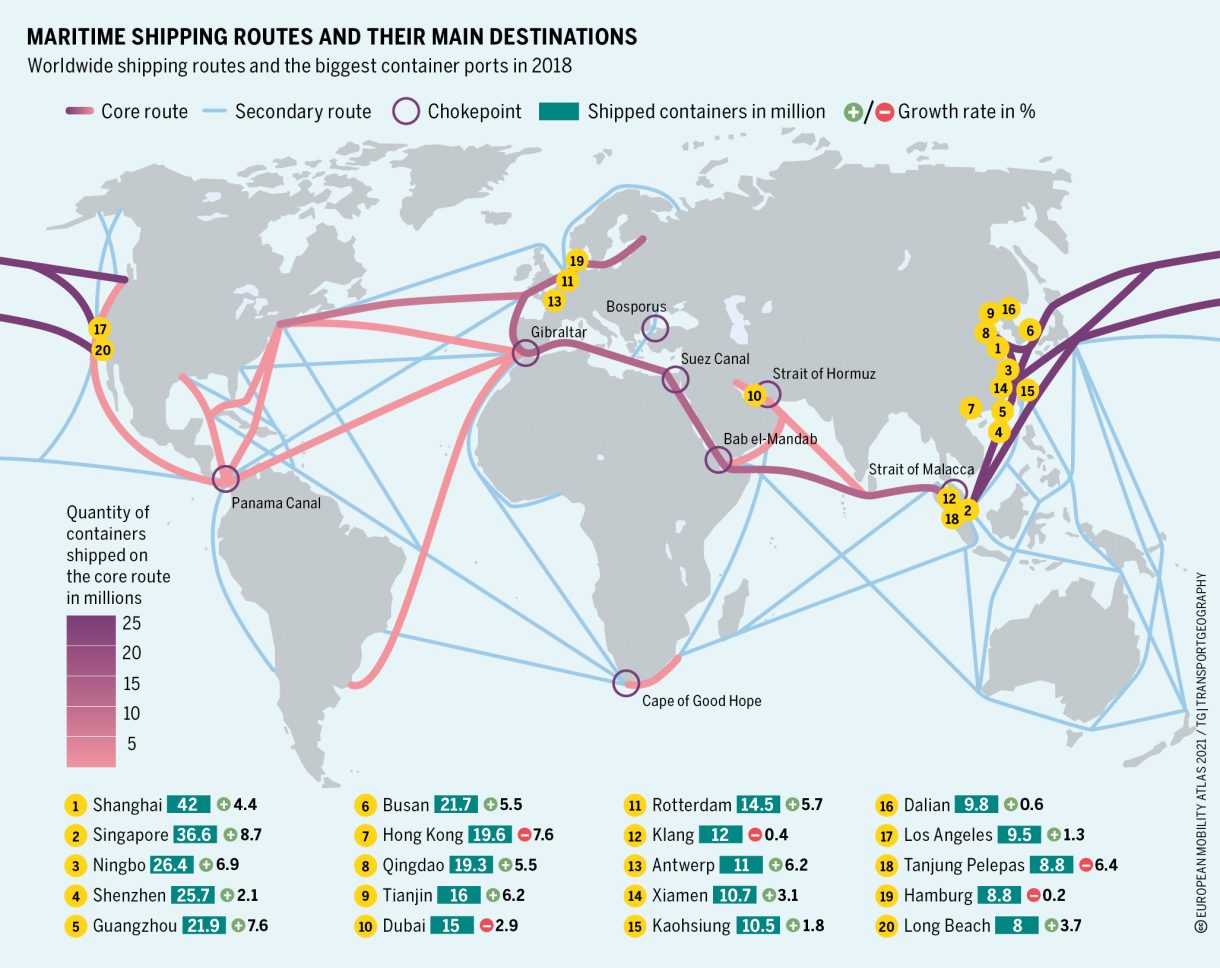Trouble at Suez & Panama Canals as Iran-Backed Attacks Raise Uncertainty
Simultaneous Problems at Panama & Suez Canals Spells Trouble for Shippers
Two of the world’s most important international shipping route connections are being disrupted simultaneously: the Panama Canal and the Suez Canal. When one important international shipping hub experiences disruption, the effects tend to ripple across the oceans to supply chains around the world. When disruption happens at more than one major shipping focal point, those ripples turn into waves, and the negative effects on supply chains can grow exponentially rather than just multiply.
Panama Drought Diverts Cargo through Suez Canal
We’ve previously covered drought in Panama causing the restrictions on the size and number of ships that can traverse the Panama Canal. The situation is ongoing, causing shippers and carriers to reroute cargo and vessels to avoid the bottleneck. In fact, just today Supply Chain Brain posted a Bloomberg article about a diesel ship sailing down and around the southern tip of South America instead of waiting to get through the Panama Canal.

Image: Main maritime shipping routes, chokepoints and biggest container ports in 2018
by Heinrich-Böll-Stiftung European Union
More commonly when there is disruption at the Panama Canal, carriers and shippers reroute goods in a way that includes the Suez Canal. That is particularly the case when talking about cargo from Asia to the U.S. East Coast or vice versa. Imagine goods normally shipped from Asia across the Pacific Ocean, through the Panama Canal, and to ports at the Atlantic Ocean or the Gulf of Mexico. If the Panama Canal connection needed to be avoided, carriers and shippers could do something like the following:
Let’s say the cargo starts around the South China Sea. It’s sailed over to the Arabian Sea, into the Gulf of Aden, and through the Red Sea, which takes it to the Suez Canal. The cargo ship comes out of the Suez Canal into the Mediterranean Sea, through the Strait of Gibraltar, and into the Atlantic Ocean. Without the Suez Canal, ships would have to instead sail all the way down and around Africa.
But that brings us to the problems over at the Suez Canal.
Attacks in Gateway to Suez Canal Escalates Problems
Since the terrorist organization Hamas savagely attacked Israel on October 7th, launching the Israel-Hamas war, there has been a big increase of attacks on ships trying to sail through the Red Sea.
Like Iran backed the October 7th Hamas attacks on Israel, Iran also backs Houthi rebels attacking merchant ships with Israeli connections in the Red Sea and the Gulf of Aden. Apparently, the Houthi rebels don’t have the best intelligence, targeting ships with outdated information that has led them to attack at least one ship that is not linked to Israel. Lori Ann LaRocco reported on it in a FreightWaves article:
Geopolitical tensions and attacks in the Red Sea have increased since the commencement of the Israel-Hamas conflict. Iran-backed Houthi rebels have focused their attacks in the Red Sea and Gulf of Aden on any merchant shipping that they believe is affiliated with Israel. Following this weekend’s four attacks on three civilian ships near Yemen, the U.S. Navy destroyer USS Carney responded, thrusting the security of trade into the spotlight.
…
The Suez has seen an increase in U.S. energy and grain exports as well as U.S. eastbound container imports as the Panama Canal drought restrictions are constricting the flow of trade.
… A Houthi military spokesperson confirmed it targeted a container ship with a drone and another bulk grain vessel because it claimed both vessels were linked to Israel. One, however, was not. Houthis reportedly had outdated information, according to maritime security firm Ambrey.
According to the U.S. Central Command (Centcom), the bulk vessel — Number 9 — that was attacked Sunday is owned by U.K.-based Castle Harbour and operated by U.K.-based Bernhard Schulte Shipmanagement (BSM) and not connected to Israel. The operator appeared to change from Zim in November 2021, according to Ambrey. MarineTraffic shows the vessel left Singapore on Nov. 22 and was slated to go through the Suez Canal this Wednesday.
Ambrey has advised company security officers to assess whether their vessels were owned or managed by an Israel-affiliated company within the last year. But the Israel connection seems to go to the individual level.
Centcom reported that another one of the four vessels attacked was the Bahamas-flagged Unity Explorer. While owned and operated in the U.K., the Israel connection is among its management. Unity Maritime is controlled by Danny Ungar, the son of Israeli shipping businessman Abraham “Rami” Ungar. In November, Ungar’s shipping company, Ray Car Carriers, had its 5,100-unit car carrier Galaxy Leader hijacked by the Houthis.
Unity Explorer is a dry bulk ship that was loaded with grain from the U.S. Cargill grain elevator and transported from the Gulf of Mexico. The vessel left Nov. 2 bound for Singapore and traveled through the Suez Canal approximately six days ago, according to MarineTraffic.
In a statement following the attacks, Centcom said, “These attacks represent a direct threat to international commerce and maritime security. They have jeopardized the lives of international crews representing multiple countries around the world. We also have every reason to believe that these attacks, while launched by the Houthis in Yemen, are fully enabled by Iran. The United States will consider all appropriate responses in full coordination with its international allies and partners.”
But given the misidentification by Houthis of the Number 9, should any ocean carrier that was once linked to Israel consider itself a target because the militants may be working with old information?
What Does This Mean for Shippers?
LaRocco goes on to write about the possibility of increased shipping costs through the area from “war risk premiums.” Obviously, risks go far beyond that.
Shippers will have to keep watch (or have company’s like Universal Cargo keep watch for them) as the risk is high for severe disruption at the Suez Canal simultaneous to worsening bottlenecks at the Panama Canal. Delays, blanked (cancelled) sailings, heavy cargo and vessel rerouting, and increased shipping costs are all likely to happen as a result of current events. Only time will tell the level of severity.
Escalating Geopolitical Situation
Even more disconcerting than its international shipping effects is how much the geopolitical situation could escalate. Iran’s “death to Israel” and “death to America” slogans are more than just words. The country has been backing those words up against Israel, although cowardly, behind the cover Hamas and Houthi as discussed above. But, since Hamas attacked Israel, there have also been over 70 attacks on U.S. troops in the Middle East, all of which are believed to have been by Iranian proxies. The U.S. shooting down a few Iranian-backed drones attacking merchant ships gives no confidence that Iran won’t escalate aggression.
Unfortunately, the track record of the current Commander and Chief of the United States when it comes to foreign affairs and military leadership is dreadful. Worse, the Wall Street Journal’s editorial board reports the Biden Administration’s relaxed sanctions on Iran keeps billions of dollars flowing into the country, even after its proxied attacks on U.S. troops and Israel.
Just a couple weeks before Hamas’s Iranian-backed attack on Israel happened, the U.S. House Committee on Oversight and Accountability reported in a release:
… the Biden Administration has participated without transparency in unlawful negotiations with Iran, facilitated a ransom payment [of $6 billion] to Iran to free five Americans, and provided no explanation for the removal of a top special envoy. Members also discussed how the Biden Administration’s reversal of the “maximum pressure” strategy has allowed Iran to skirt sanctions, supply U.S. adversaries like China and Russia with oil and weapons, and decrease stability in the Middle East.
Funding the country that chants “Death to Israel” and “Death to America” and then funds the worst attack on Israel the country has ever seen? Some of that blood on Israel’s streets may belong on President Biden’s hands.





